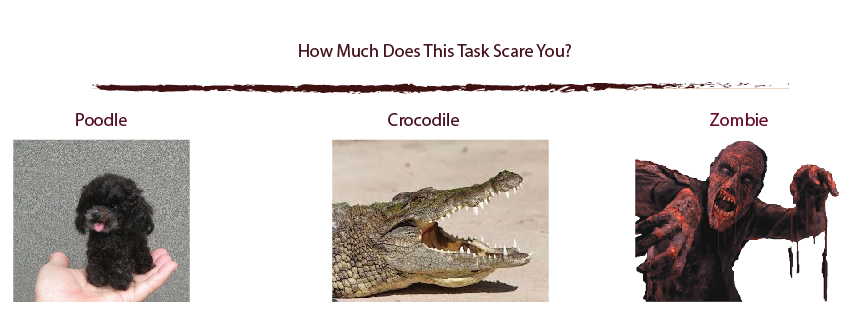Tell me Clarice, are the features still screaming?
Sometimes work is terrifying. We’re asked to do something that we know, or at least strongly suspect, won’t work. Maybe we’re asked to do several things - many are simple, but one or two make us uncomfortable. We might even place a hard estimate on a task (“It’ll take six hours!) and deep down something doesn’t feel right.
Oh well, I’ll just figure that out later.
We spend a lot of time guessing how long our work will take. Psychologists have shown this to be a foolish endeavor. They point to the Planning Fallacy or to Hofstadter’s Law which both show that we are notoriously bad at estimating complex tasks.
But all our work isn’t complex. So we end up with some pretty reliable estimates and some that are wildly off. Those that are wildly off ruin our otherwise fairly predictable projects.
The tendency here would be to try to get rid of those hard-to-estimate tasks.
Good luck with that.
Certainly, we should always be looking at how long it takes for us to complete things and refine how we project costs and completion times. But variation and difficult tasks run hand-in-hand with knowledge work. Sometimes, we actually have to think about things.
There may a way out of this.
Work runs along a continuum that looks something like this:
 Work is either not scary at all, kind of scary (but in a way you can shoot it), and scary in a way that you’re just unequipped to handle. Or, as we might call them, Poodle, Crocodile, and Zombie.
Work is either not scary at all, kind of scary (but in a way you can shoot it), and scary in a way that you’re just unequipped to handle. Or, as we might call them, Poodle, Crocodile, and Zombie.
We want to know, when are starting some work, which tasks we’ve been given are we comfortable with (and therefore comfortable with the estimate) or which work scares us and to what degree.
I’ve found that teams will give very definite estimates to tasks they are horribly terrified of actually working on. Level of apprehension in the team is an excellent barometer for risk currently being taken on. Risk, in this case, is fairly well mapped to taking on complex tasks (in theCynefin sense). And the good news is, there are ways of dealing with complex tasks.

We can then break our work up into Simple / Complex tasks that can be undertaken by a person or a team with a generally clear view of what they are to do and how it will be done. So Poodle to Light Crocodile tasks can be assigned to people with a modicum of comfort that the time estimate can be met.
Crocodile to Full-On Zombie levels of apprehension, however, indicate that we require a different approach to the completion of the task.
Estimates Are Waste - The first thing to come to terms with this task as it comes at you is that it does not respect your guesswork. Your estimate is as useless as a handgun against Godzilla. Or a zombie…
One Brain Bad, Four Brains Good - Complex problems are complex in their composition, their implications, and their solution sets. When we run into a complex problem that scares individuals on the team, it is likely the solution to that problem is not right on the tip of someone’s tongue. (And if it is they are likely suffering from Belief Bias). We therefore want to work on complex problems in groups to foster conversation about the solution as it is happening and employ multiple points of view to reaching a meaningful conclusion.
Experiments Precede Products - These aren’t tasks we just complete and move on. We need to make sure we actually built the right thing. Each complex problem has multiple potential solutions. We need to test the assumptions inherent in our solution by creating an experiment. This could be a mock-up, a prototype, or even a limited release. Whatever we choose, we need to know that “done” for a complex task means proven.
What all this means
We have two types of work -
- Work we think is safe
- Work we think is risky
We’re still going to be wrong and some risky work will sneak in. However, if we understand that our estimates are often blown out of the water by risky work that was identifiable up-frontthen we can honestly respond to those risks. Right now, we blithely ignore our discomfort and sally forth.
Let’s be honest and get some real work done. Ask which work items worry people and give that fear the respect it deserves.


